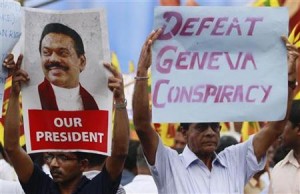The cruelty of war and the rhetoric of justice
March 20, 2012 1 Comment
Ayushman Jamwal
The DMK leadership in Tamil Nadu has warned the government that it will pull its ministers from the Centre if it does not back a US sponsored UN resolution calling for an independent investigation into war crimes committed by the Sri Lankan government against Tamil civilians. As the UPA government maneuvers to maintain stability, pandering to the whims of Mamta Banerjee over the Railway budget and courting other state powers for assurances of support, it seems the direction of India’s foreign policy has also fallen to the self serving push and pull of regional politics.
In a campaign for hearts and minds, many media elements have come to serve the agenda of the DMK. The news in the past few days have featured endless loops of videos showcasing atrocities of Sri Lankan army personnel against suspected LTTE members, the shelling of LTTE strongholds, and famously the death of Prabhakaran’s young son. With interviews from international human rights advocates and lawyers, they have effectively become mouthpieces of the transnational groups condemning the Rajapaksa government. It’s no surprise that after years of battling the US government over its role in international wars, these groups have been gifted a political opening to vent their anger in a different direction.
The DMK is campaigning for justice for Sri Lankan Tamils primarily to consolidate their vote bank of Indian Tamils. But we the citizenry should seek a balanced picture. If an investigation is launched into war crimes committed by the Sri Lankan government then every Sri Lankan who voted for Rajapaksa is complicit in those crimes. The war with the LTTE was no covert affair. It raged for decades and killed thousands. During his political campaign Rajapaksa promised the people that he would subdue the Tamil Tigers to end the war. He was sworn in as President in November 2005 and re-elected for a second term in January 2010 after defeating the LTTE. Rajapaksa came and delivered, and the international community wants to punish him for that. Let’s not forget that the LTTE was a terrorist organization that killed thousands of innocent civilians including the former Prime Minister of India, Rajiv Gandhi. They chose to wage war against a superior military force without robust international support, and sidelined a peaceful political campaign for the rights of Sri Lankan Tamils. They did no favours to the community they were supposedly fighting for. In fact, the LTTE sealed their fate to be maligned by the Sinhalese population and become targets in a brutal war.
The Rastafarian philosopher Haile Sallassie once said, “Death takes what it wants indiscriminately in peace time and in war.” Being ‘civilised’ is not in the nature of the beast as history would tell. There will never be no code of conduct during a conflict. Yet, for political convenience leaders initiate investigations after hostilities are over. The LTTE lost the war with the Sri Lankan government. It’s that simple. Assuming the Rajapaksa government agrees to an investigation, the most it can produce is a scapegoat. Some wounds may heal but no true justice will be served.
But we can change by striving tirelessly to prevent war. That is where investigations by national and transnational bodies alike needs to be directed in the future – to prevent warfare rather than vainly blaming someone for it in the aftermath.


